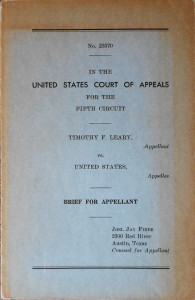 Happy Halloween, with the most recent “5 cases to know” update from 600Camp – you can read it here, complete with case links.
Happy Halloween, with the most recent “5 cases to know” update from 600Camp – you can read it here, complete with case links.
Monthly Archives: October 2015
 In 2013, a Fifth Circuit panel reversed the NLRB and held that “an employer does not engage in unfair labor practices by maintaining and enforcing an arbitration agreement prohibiting employee class or collective actions and requiring employment-related claims to be resolved through individual arbitration.” D.R. Horton, Inc. v. NLRB, 737 F.3d 344 (5th Cir. 2013). The NLRB, not bound in other jurisdictions by that holding, reaffirmed its original holding in the D.R. Horton case in another matter involving Murphy Oil. Unfortunately for the NLRB, the venue rules for review of its decisions allowed Murphy to appeal to the Fifth Circuit, which – unsurprisingly – again reversed the NLRB. As in the prior case, the Court did not reverse as to a requirement that the employer clarify its documents to be clear that employees were not waiving the right to make Board charges. Murphy Oil USA, Inc. v. NLRB, No. 14-60800 (Oct. 26, 2015).
In 2013, a Fifth Circuit panel reversed the NLRB and held that “an employer does not engage in unfair labor practices by maintaining and enforcing an arbitration agreement prohibiting employee class or collective actions and requiring employment-related claims to be resolved through individual arbitration.” D.R. Horton, Inc. v. NLRB, 737 F.3d 344 (5th Cir. 2013). The NLRB, not bound in other jurisdictions by that holding, reaffirmed its original holding in the D.R. Horton case in another matter involving Murphy Oil. Unfortunately for the NLRB, the venue rules for review of its decisions allowed Murphy to appeal to the Fifth Circuit, which – unsurprisingly – again reversed the NLRB. As in the prior case, the Court did not reverse as to a requirement that the employer clarify its documents to be clear that employees were not waiving the right to make Board charges. Murphy Oil USA, Inc. v. NLRB, No. 14-60800 (Oct. 26, 2015).
Ybarra sued the Dish Network, alleging that he received seven calls from it in violation if the Telephone Consumer Protection Act. The trial court granted partial summary judgment for Ybarra on three of the calls, after which the parties agreed to the dismissal of the remaining claims. Dish appealed, and Ybarra objected because the final judgment did  not reserve Dish’s right to appeal. Distinguishing the much-criticized case of Amstar Corp. v. Southern Pacific, 607 F.2d 1100 (5th Cir. 1979), the Fifth Circuit concluded: “Amstar only precludes the appeal of a claim directly covered by the consent judgment. Here, claims subject the partial summary judgment are independent of the settled claims. The reservation of a right to appeal [in the settlement agreement] was effective.” Ybarra v. Dish Network, No. 14-11316 (Oct. 20, 2015).
not reserve Dish’s right to appeal. Distinguishing the much-criticized case of Amstar Corp. v. Southern Pacific, 607 F.2d 1100 (5th Cir. 1979), the Fifth Circuit concluded: “Amstar only precludes the appeal of a claim directly covered by the consent judgment. Here, claims subject the partial summary judgment are independent of the settled claims. The reservation of a right to appeal [in the settlement agreement] was effective.” Ybarra v. Dish Network, No. 14-11316 (Oct. 20, 2015).
 Guzman sued Celadon Trucking for personal injuries. On May 9, 2011, Celadon’s counsel asked him to undergo an independent medical exam. On May 27, Guzman said in his deposition that he intended to undergo back surgery. Celadon later contended that his surgery constituted spoliation of evidence, and requested an adverse jury instruction. The Fifth Circuit affirmed its denial, noting: “After [Celadon’s counsel] received this disclosure in the deposition, they made no request to be informed of his surgery date, nor did they ask that he delay surgery pending his examination. Only after the examination was completed did [they] assert that the surgery had meaningfully altered evidence. While the timing of Guzman’s surgery may seem strange, there is no evidence to suggest that he acted in a manner intended to deceive [Celadon] or that he undertook the surgery with the intent of destroying or altering evidence.” Guzman v. Jones, No. 15-40007 (Oct. 22, 2015).
Guzman sued Celadon Trucking for personal injuries. On May 9, 2011, Celadon’s counsel asked him to undergo an independent medical exam. On May 27, Guzman said in his deposition that he intended to undergo back surgery. Celadon later contended that his surgery constituted spoliation of evidence, and requested an adverse jury instruction. The Fifth Circuit affirmed its denial, noting: “After [Celadon’s counsel] received this disclosure in the deposition, they made no request to be informed of his surgery date, nor did they ask that he delay surgery pending his examination. Only after the examination was completed did [they] assert that the surgery had meaningfully altered evidence. While the timing of Guzman’s surgery may seem strange, there is no evidence to suggest that he acted in a manner intended to deceive [Celadon] or that he undertook the surgery with the intent of destroying or altering evidence.” Guzman v. Jones, No. 15-40007 (Oct. 22, 2015).
 After losing a state court lawsuit, Martin Resource Management settled with its primary insurer (Zurich) for less than policy limits. Axis, the excess carrier, won summary judgment with the argument that this settlement did not trigger coverage, and the Fifth Circuit affirmed. The Axis policy said: “The Insurance afforded under this Policy shall apply only after all applicable Underlying Insurance . . . has been exhausted by actual payment under such Underlying Insurance[.]” Martin Resource Management Corp. v. Axis Ins. Co., No. 14-40512 (Oct. 21, 2015) (applying Citigroup, Inc. v. Federal Ins. Co., 649 F.3d 367, 371-73 (5th Cir. 2011)).
After losing a state court lawsuit, Martin Resource Management settled with its primary insurer (Zurich) for less than policy limits. Axis, the excess carrier, won summary judgment with the argument that this settlement did not trigger coverage, and the Fifth Circuit affirmed. The Axis policy said: “The Insurance afforded under this Policy shall apply only after all applicable Underlying Insurance . . . has been exhausted by actual payment under such Underlying Insurance[.]” Martin Resource Management Corp. v. Axis Ins. Co., No. 14-40512 (Oct. 21, 2015) (applying Citigroup, Inc. v. Federal Ins. Co., 649 F.3d 367, 371-73 (5th Cir. 2011)).
 Hilda Garza sued Starr County for wrongfully discharging her as a county attorney, in retaliation for announcing her candidacy for the local school board, and she won a $1.4 million verdict for front pay at trial. The district court set aside the verdict as advisory, reasoning that it went to an issue of equitable relief, and allowed the County to offer her reinstatement as an alternative remedy. The Fifth Circuit reversed. While Fed. R. Civ. P. 39(c) allows an advisory jury, it does not apply when: (1) the parties voluntarily submit an issue to a jury without formal objection, and (2) the district court does not announce in advance that the verdict is advisory. Garza v. Starr County, Texas, No. 14-41343 (Oct. 20, 2015, unpublished) (citing, inter alia, Alcatel USA, Inc. v. DGI Techs., Inc., 166 F.3d 772 (5th Cir. 1999)). (The County also challenged the award as excessive; while noting that the “more prudent course” would have been for the County to cross-appeal, the Court allowed the County to raise that issue on remand — although noting that the County’s lack of earlier objections would limit what it could raise.)
Hilda Garza sued Starr County for wrongfully discharging her as a county attorney, in retaliation for announcing her candidacy for the local school board, and she won a $1.4 million verdict for front pay at trial. The district court set aside the verdict as advisory, reasoning that it went to an issue of equitable relief, and allowed the County to offer her reinstatement as an alternative remedy. The Fifth Circuit reversed. While Fed. R. Civ. P. 39(c) allows an advisory jury, it does not apply when: (1) the parties voluntarily submit an issue to a jury without formal objection, and (2) the district court does not announce in advance that the verdict is advisory. Garza v. Starr County, Texas, No. 14-41343 (Oct. 20, 2015, unpublished) (citing, inter alia, Alcatel USA, Inc. v. DGI Techs., Inc., 166 F.3d 772 (5th Cir. 1999)). (The County also challenged the award as excessive; while noting that the “more prudent course” would have been for the County to cross-appeal, the Court allowed the County to raise that issue on remand — although noting that the County’s lack of earlier objections would limit what it could raise.)
 The defendants in Bartel v. Alcoa Steamship Co. sought to remove three Jones Act cases to federal court under the Federal Officer Removal Statute, 28 U.S.C. § 1442(a)(1). While each of the cases involved a United States Naval Ship (one owned by the Navy but operated by civil contractors), “no evidence show[ed] that the government actually exercised continuing oversight over operations aboard ship,” meaning that “the Federal Officer Defendants operated the vessels in a largely independent fashion and, at a minimum, were free to adopt the safety measures the plaintiffs now allege would have prevented their injuries.” Accordingly, the Fifth Circuit affirmed the remand of the cases. No. 15-30004 (Oct. 19, 2015). [As a procedural note, those defendants had already been dismissed, but their dismissal did not affect the analysis of whether removal was proper at the time it occurred.]
The defendants in Bartel v. Alcoa Steamship Co. sought to remove three Jones Act cases to federal court under the Federal Officer Removal Statute, 28 U.S.C. § 1442(a)(1). While each of the cases involved a United States Naval Ship (one owned by the Navy but operated by civil contractors), “no evidence show[ed] that the government actually exercised continuing oversight over operations aboard ship,” meaning that “the Federal Officer Defendants operated the vessels in a largely independent fashion and, at a minimum, were free to adopt the safety measures the plaintiffs now allege would have prevented their injuries.” Accordingly, the Fifth Circuit affirmed the remand of the cases. No. 15-30004 (Oct. 19, 2015). [As a procedural note, those defendants had already been dismissed, but their dismissal did not affect the analysis of whether removal was proper at the time it occurred.]
 In a case that has now gone en banc, the plaintiffs in Torres v. S.G.E. Management, 805 F.3d 145 (5th Cir. 2015), alleged that they were victims of an alleged pyramid scheme about a multi-level marketing program to sell electricity. The district court certified a class, acknowledging that the plaintiffs could not show a common misrepresentation, but concluding that they could show a common failure to disclose the illegality of such a scheme. In other words, “Because it can rationally be assumed (at least without any contravening evidence) that the legality of the Ignite program was a bedrock assumption of every class member, a showing that the program was actually a facially illegal pyramid scheme would provide the necessary proximate cause.”
In a case that has now gone en banc, the plaintiffs in Torres v. S.G.E. Management, 805 F.3d 145 (5th Cir. 2015), alleged that they were victims of an alleged pyramid scheme about a multi-level marketing program to sell electricity. The district court certified a class, acknowledging that the plaintiffs could not show a common misrepresentation, but concluding that they could show a common failure to disclose the illegality of such a scheme. In other words, “Because it can rationally be assumed (at least without any contravening evidence) that the legality of the Ignite program was a bedrock assumption of every class member, a showing that the program was actually a facially illegal pyramid scheme would provide the necessary proximate cause.”
The Fifth Circuit disagreed: “[A]n investor could reasonably choose to knowingly invest in a pyramid scheme in the hope that they would make money. As we have already explained, a pyramid scheme provides an opportunity for those at the top of the pyramid to profit from their investments. While many of the Plaintiffs might have decided to invest in the scheme in the belief that it was legal, it is equally possible that many of the Plaintiffs chose to invest in the scheme in the belief that, legal or illegal, it provided them with an opportunity to make money.” Accordingly, because Plaintiffs had to establish reliance with individualized proof, the Court decertified the class.
A detailed dissent warned: “By erecting this barrier to class certification based on nothing more than the theoretical possibility of prior knowledge of illegality, the panel majority creates an insurmountable barrier in this circuit to future class certification of cases that claim the presence of an illegal pyramid scheme. But, even worse, because individuals who are duped into joining such schemes uniformly invest relatively few dollars, none will possibly be able to afford to litigate their individual claims separately. Absent the availability of a class action, there simply will be no possibility of court challenges to such pyramid schemes.”
 In a bankruptcy appeal to district court, the appellant’s brief was due on November 4. It did not file; the appellee moved to dismiss a month later, and the appellant was denied leave to file late. The Fifth Circuit found no abuse of discretion in that decision, looking to the factors about leave for late filings identified in Salts v. Epps, 676 F.3d 468, 474 & n.13 (5th Cir. 2012). The Court noted: “In the order granting Tarbox’s motion to dismiss, the district court found: 1) ‘the delay of over one month has prejudiced Appellee’ in its state court suit against [Appellant]; 2) the ‘thirty-four day delay’ ‘is substantial, and could have been easily avoided through basic diligence’; 3) ‘Appellant’s failure to exercise diligence in filing and pursuing its appeal was the sole reason for the delay’; and 4) ‘“Appellant has not shown good cause to excuse the late filing.” Neurology & Neurophysiology Assocs., P.A. v. Tarbox, No. 15-50105 (Oct. 15, 2015, unpublished).
In a bankruptcy appeal to district court, the appellant’s brief was due on November 4. It did not file; the appellee moved to dismiss a month later, and the appellant was denied leave to file late. The Fifth Circuit found no abuse of discretion in that decision, looking to the factors about leave for late filings identified in Salts v. Epps, 676 F.3d 468, 474 & n.13 (5th Cir. 2012). The Court noted: “In the order granting Tarbox’s motion to dismiss, the district court found: 1) ‘the delay of over one month has prejudiced Appellee’ in its state court suit against [Appellant]; 2) the ‘thirty-four day delay’ ‘is substantial, and could have been easily avoided through basic diligence’; 3) ‘Appellant’s failure to exercise diligence in filing and pursuing its appeal was the sole reason for the delay’; and 4) ‘“Appellant has not shown good cause to excuse the late filing.” Neurology & Neurophysiology Assocs., P.A. v. Tarbox, No. 15-50105 (Oct. 15, 2015, unpublished).
 Eric Eddy alleged injury from a printing press. The Fifth Circuit affirmed for lack of personal jurisdiction in Texas, holding:
Eric Eddy alleged injury from a printing press. The Fifth Circuit affirmed for lack of personal jurisdiction in Texas, holding:
1. “Once the press was installed in Mississippi, it exited the stream of commerce because the Mississippi buyer was a consumer of the product, not a distributor or retailer.” After that point, the movement of the press “was the result of ‘fortuitous’ and ‘attenuated’ acts of third parties[.]” (The last sentence echoes the Supreme Court’s recent emphasis of this general concept in Walden v. Fiore, 134 S. Ct. 1115 (2014)).
2. While spare parts for the press were shipped by the defendant to Texas, no evidence showed that those parts contributed to the plaintiff’s injury, and the defendant “introduced uncontroverted evidence establishing that the drive shaft Eddy alleged caused his injury was not, and could not have been, the same shaft that was shipped with the spare parts.”
Eddy v. The Printers House (P) Limited, No. 15-10370 (Oct. 2, 2015, unpublished).
 A dispute about the scope a “Chinese drywall” settlement illustrates the operation of complex class settlements. Defendants settled with a broadly-defined group of claimants about defective drywall, but limited to claims involving “Affected Property.” Defendants sought to enjoin a case by a class member who alleged that his condominium – which did not have Chinese drywall – had lost value because of its association with a neighboring property that did have defective Chinese drywall (also called or a “stigma” claim). The district court denied the request and the Fifth Circuit affirmed. Mangiarelli v. Sixty-Fifth and One, LLC, No. 14-31355 (Oct. 2, 2015, unpublished). The Court distinguished between the situation when “individuals [are] ‘class members’ under a settlement agreement, yet [are] barred from recovery under the terms of that agreement” from this situation, where the plaintiff “was never entitled to a benefit under the . . . agreements in exchange for releasing his stigma claims.”
A dispute about the scope a “Chinese drywall” settlement illustrates the operation of complex class settlements. Defendants settled with a broadly-defined group of claimants about defective drywall, but limited to claims involving “Affected Property.” Defendants sought to enjoin a case by a class member who alleged that his condominium – which did not have Chinese drywall – had lost value because of its association with a neighboring property that did have defective Chinese drywall (also called or a “stigma” claim). The district court denied the request and the Fifth Circuit affirmed. Mangiarelli v. Sixty-Fifth and One, LLC, No. 14-31355 (Oct. 2, 2015, unpublished). The Court distinguished between the situation when “individuals [are] ‘class members’ under a settlement agreement, yet [are] barred from recovery under the terms of that agreement” from this situation, where the plaintiff “was never entitled to a benefit under the . . . agreements in exchange for releasing his stigma claims.”
 NiGen alleged that the Texas Attorney General systematically sent harassing letters to retailers, warning against stocking its “amino acid building blocks” product. At least as to future activity by the AG, the Fifth Circuit found that NiGen had standing to complain and could allege a claim for injunctive relief to enforce federal law under Ex parte Young: “None of these cases sought, like NiGen’s, to lift a yoke of alleged unconstitutional conduct from the plaintiff’s own shoulders.” NiGen Biotech, LLC v. Paxton, No. 14-10923 (Sept. 23, 2015).
NiGen alleged that the Texas Attorney General systematically sent harassing letters to retailers, warning against stocking its “amino acid building blocks” product. At least as to future activity by the AG, the Fifth Circuit found that NiGen had standing to complain and could allege a claim for injunctive relief to enforce federal law under Ex parte Young: “None of these cases sought, like NiGen’s, to lift a yoke of alleged unconstitutional conduct from the plaintiff’s own shoulders.” NiGen Biotech, LLC v. Paxton, No. 14-10923 (Sept. 23, 2015).
 The case of Ferguson v. Bank of New York reminds of two basic principles in the area of mortgage servicing litigation: (1) MERS can be named as a beneficiary under a deed of trust; and (2) a borrower does not ordinarily have standing to enforce the terms of a pooling & servicing agreement. The Court sidestepped an issue of whether the Texas fraudulent lien statute could apply if a lender simply transferred a lien as opposed to creating it. No. 14-20585 (Oct. 1, 2015).
The case of Ferguson v. Bank of New York reminds of two basic principles in the area of mortgage servicing litigation: (1) MERS can be named as a beneficiary under a deed of trust; and (2) a borrower does not ordinarily have standing to enforce the terms of a pooling & servicing agreement. The Court sidestepped an issue of whether the Texas fraudulent lien statute could apply if a lender simply transferred a lien as opposed to creating it. No. 14-20585 (Oct. 1, 2015).
 The Fifth Circuit reversed a ruling that declined to enforce a Moroccan judgment in the case of Dejoria v. Maghreb Petroleum Exploration, S.A., No. 14-51022 (Sept. 30, 2015). Acknowledging that the Moroccan court system has been criticized for a lack of independence from that country’s king, the Court concluded that “we cannot agree that the Moroccan judicial system lacks sufficient independence such that fair litigation in Morocco is impossible,” and that the defendant had not shown that “Morocco would not recognize an otherwise enforceable foreign judgment only because the judgment was rendered in Texas.” The Court distinguished other cases involving Iranian “revolutionary courts” and the Liberian court system during that country’s civil war, saying they “exemplify how a foreign judicial system can be so fundamentally flawed as to offend basic notions of fairness.”
The Fifth Circuit reversed a ruling that declined to enforce a Moroccan judgment in the case of Dejoria v. Maghreb Petroleum Exploration, S.A., No. 14-51022 (Sept. 30, 2015). Acknowledging that the Moroccan court system has been criticized for a lack of independence from that country’s king, the Court concluded that “we cannot agree that the Moroccan judicial system lacks sufficient independence such that fair litigation in Morocco is impossible,” and that the defendant had not shown that “Morocco would not recognize an otherwise enforceable foreign judgment only because the judgment was rendered in Texas.” The Court distinguished other cases involving Iranian “revolutionary courts” and the Liberian court system during that country’s civil war, saying they “exemplify how a foreign judicial system can be so fundamentally flawed as to offend basic notions of fairness.”
 Underwood Cotton sued Clark Freight Lines, seeking a declaratory judgment about alleged overcharges on invoices for shipping containers. Clark removed the case on the basis of complete preemption, and counterclaimed for payment of the invoices. The district court dismissed the counterclaim and remanded, finding that federal jurisdiction had not been established over the declaratory judgment or the “converse breach of contract action” brought by Clark. The Fifth Circuit dismissed the resulting appeal, finding: “[T]he dismissal of the counterclaims did not precede the remand in logic and fact. Dismissing the counterclaims did not deprive the court of subject-matter jurisdiction; the district court ruled it never had jurisdiction to begin with.” Underwood Cotton Co. v. Clark Freight Lines, Inc., No. 14-11327 (Sept. 28, 2015, unpublished). The Court noted that the counterclaims could proceed in state court notwithstanding the district court’s jurisdictional ruling.
Underwood Cotton sued Clark Freight Lines, seeking a declaratory judgment about alleged overcharges on invoices for shipping containers. Clark removed the case on the basis of complete preemption, and counterclaimed for payment of the invoices. The district court dismissed the counterclaim and remanded, finding that federal jurisdiction had not been established over the declaratory judgment or the “converse breach of contract action” brought by Clark. The Fifth Circuit dismissed the resulting appeal, finding: “[T]he dismissal of the counterclaims did not precede the remand in logic and fact. Dismissing the counterclaims did not deprive the court of subject-matter jurisdiction; the district court ruled it never had jurisdiction to begin with.” Underwood Cotton Co. v. Clark Freight Lines, Inc., No. 14-11327 (Sept. 28, 2015, unpublished). The Court noted that the counterclaims could proceed in state court notwithstanding the district court’s jurisdictional ruling.
 The Fifth Circuit reversed the dismissal of misrepresentation claims about the sale of a house with mold problems, finding that this disclaimer was not dispositive: “Buyer is hereby advised that mold and/or other microscopic organisms may exist at the property known as 1425 MAGNOLIA RIDGE, BOSSIER CITY, LA, 71112. . . . Buyer acknowledges and agrees to accept full responsibility/risk for any matters that may result from microscopic organisms and/or mold and to hold harmless, release, and indemnify Seller and Seller’s managing agents from any liability/recourse/damages (financial or otherwise). Buyer understands that Seller has taken no action to remediate mold. . . . The purpose of this disclaimer is to put Buyers on notice to conduct their own due diligence regarding this matter using appropriate, qualified experts[.]” Jones v. Wells Fargo Bank, No. 15-30031 (Sept. 28, 2015, unpublished).
The Fifth Circuit reversed the dismissal of misrepresentation claims about the sale of a house with mold problems, finding that this disclaimer was not dispositive: “Buyer is hereby advised that mold and/or other microscopic organisms may exist at the property known as 1425 MAGNOLIA RIDGE, BOSSIER CITY, LA, 71112. . . . Buyer acknowledges and agrees to accept full responsibility/risk for any matters that may result from microscopic organisms and/or mold and to hold harmless, release, and indemnify Seller and Seller’s managing agents from any liability/recourse/damages (financial or otherwise). Buyer understands that Seller has taken no action to remediate mold. . . . The purpose of this disclaimer is to put Buyers on notice to conduct their own due diligence regarding this matter using appropriate, qualified experts[.]” Jones v. Wells Fargo Bank, No. 15-30031 (Sept. 28, 2015, unpublished).
The district court removed a bankruptcy trustee after he sought to bill a family trip to New Orleans to the estate, noting two past situations where the court had an issue with the trustee’s practices. The Fifth Circuit affirmed, rejecting several challenges to that ruling based primarily on the consideration of the past situations, holding: “The district courts and in turn the bankruptcy courts are the keepers of the temple. These courts rely on the bar to abide by its strict rules and norms of conduct. Bankruptcy practice presents many tasks attended and girded by strict identity of duty and diligence by its officers. The courts below were only minding their role: not to end, but to redirect a distinguished presence at the bar, and to give sustenance to necessarily demanding norms of practice. That this is expected does not diminish its importance.” Smith v. Robbins, No. 14-20588 (Sept. 25, 2015).